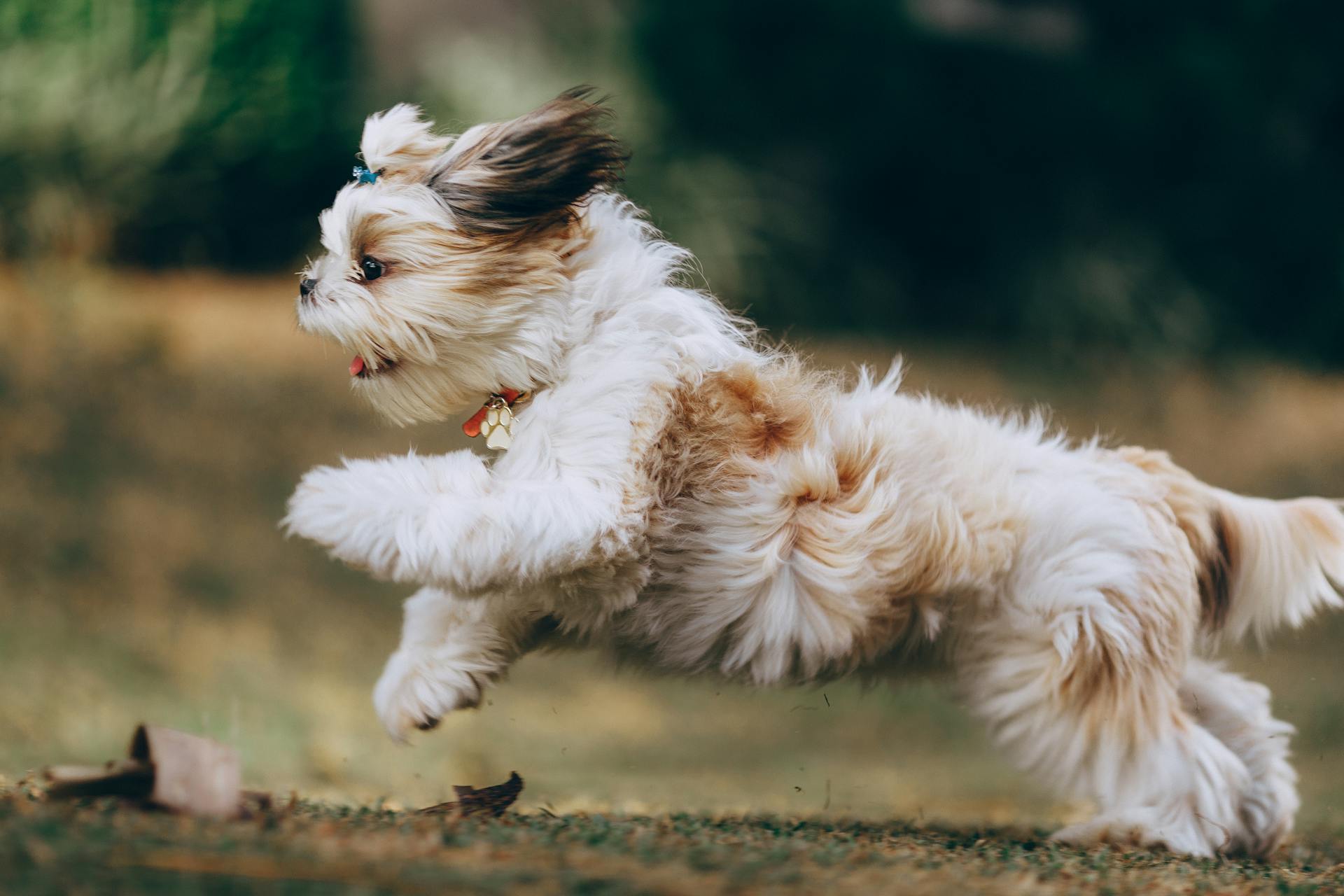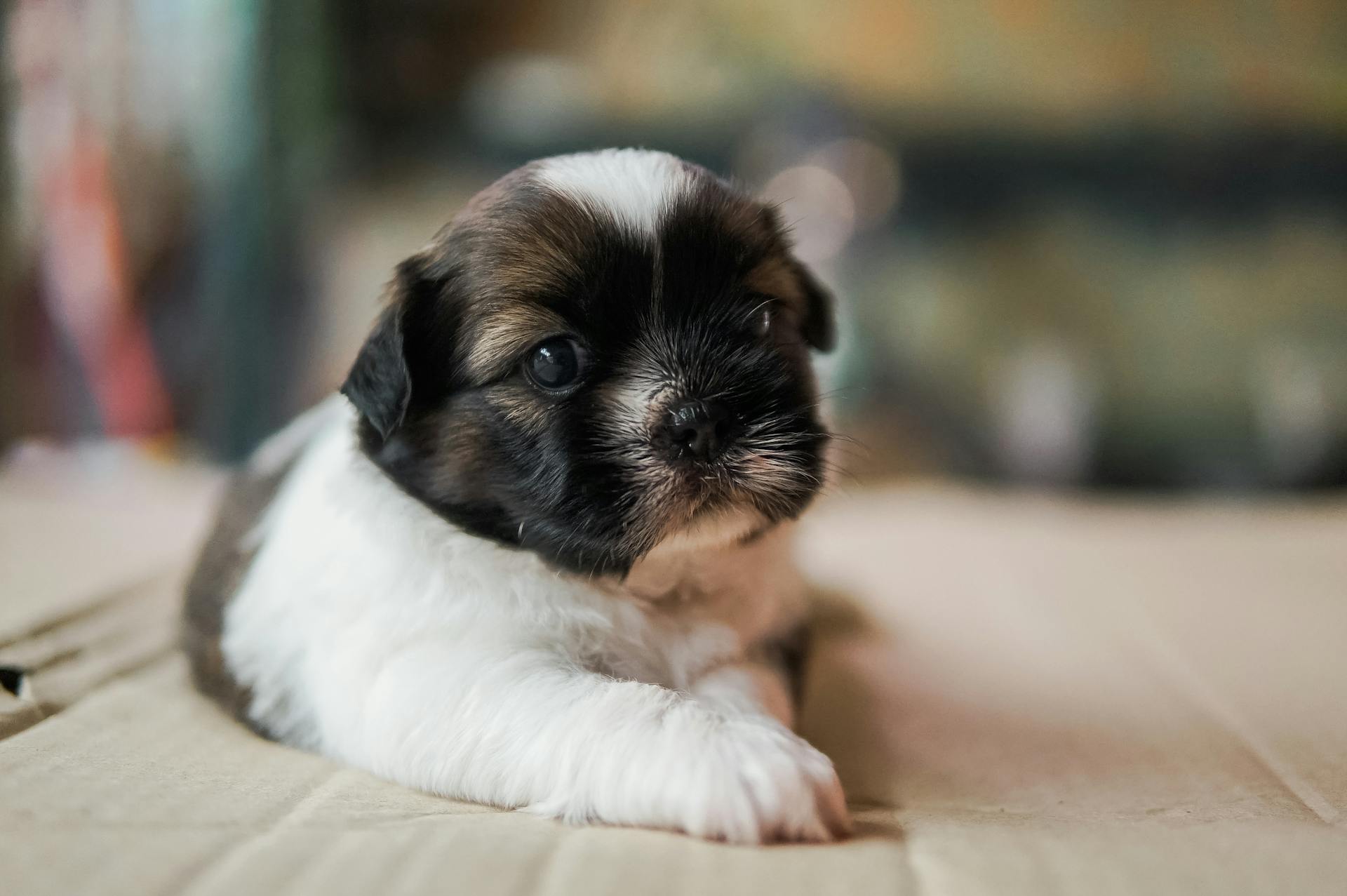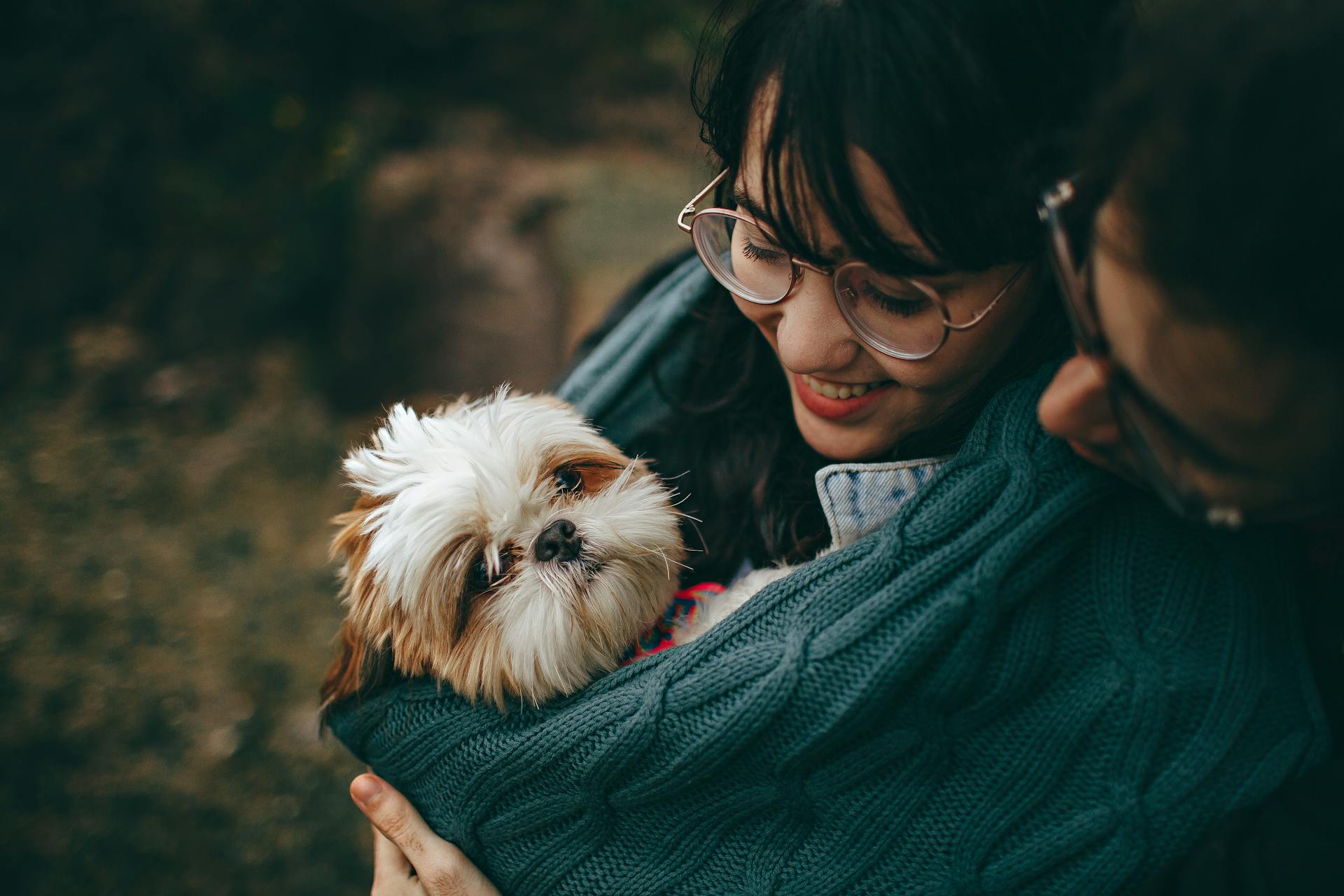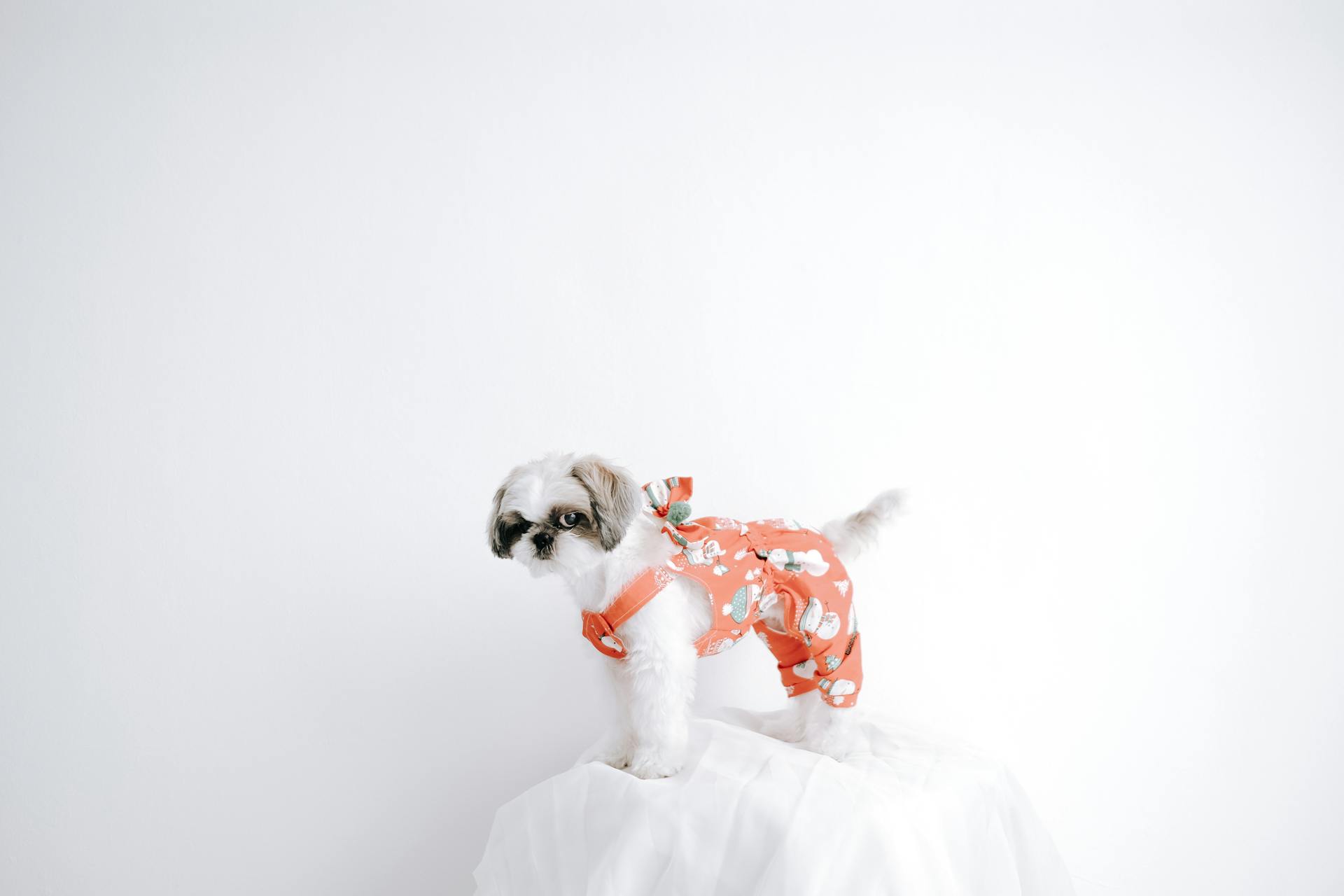
The Shih Tzu is a loyal and affectionate dog breed that originated in Tibet and was later bred in China as a palace pet for royalty. They are known for their distinctive long coats and outgoing personalities.
One of the most distinctive features of the Shih Tzu is their long, flowing coat, which requires regular grooming to prevent matting and tangling. Shih Tzus have a double coat, with a soft undercoat and a long, straight outer coat that can grow up to 10 inches in length.
Shih Tzus are a relatively small breed, weighing between 9 and 16 pounds and standing between 8 and 11 inches tall at the shoulder. Despite their small size, they are sturdy and compact dogs that make great companions for apartment dwellers.
To keep your Shih Tzu happy and healthy, it's essential to provide them with regular exercise and mental stimulation. A daily walk and some playtime should suffice, but be sure to avoid overexerting your Shih Tzu, especially in hot weather.
For your interest: Shih Tzu Good with Kids
Traits and Characteristics
Shih Tzus are small dogs, typically weighing between 9 and 16 pounds and standing 9 to 11 inches tall.
Their coat can grow to reach floor lengths and requires frequent trips to the groomer, with many different Shih Tzu haircuts to choose from.
Shih Tzus are social, friendly, and affectionate dogs, always happy to be by your side.
They embody the true spirit of a companion breed, just as happy to accompany you on a walk as they are to curl up next to you on the couch.
Unfortunately, this also means some Shih Tzus can suffer from separation anxiety, so leaving them alone for longer periods can take some special training.
Shih Tzus are known to make great family pets, typically getting along great with kids and other pets of all kinds.
However, caution should be taken around young children or large dogs that could accidentally injure the Shih Tzu during play.
Here are some common health issues that can affect Shih Tzus:
- Brachycephalic Obstructive Airway Syndrome or BOAS (a set of respiratory conditions)
- Collapsing Trachea
- Hip Dysplasia
- Luxating Patella (dislocated kneecap)
- Portosystemic Shunt (liver shunt)
- Kidney Disease
- Cataracts
- Glaucoma
- Dental Disease
- Ear Infections
- Obesity
Dog Care
Shih Tzus are known for their luxurious long hair, which requires regular grooming to prevent matting and tangling.
Regular grooming is essential for showing off your Shih Tzu's beautiful coat and keeping it out of their eyes. Daily brushing is necessary, especially of the top knot and beard hair.
Shih Tzus need to be brushed daily, and a pin comb, pin brush, or slicker brush is the best tool for the job.
Bathe your Shih Tzu once a month to keep their coat clean and prevent dirt buildup.
A long, fine, dense coat requires extensive grooming, and professional grooming may be needed to keep it looking its best.
Shih Tzus are low-shedding dogs, which means they require less daily exercise than other breeds.
See what others are reading: When Is the Best Time to Breed a Dog
Health and Nutrition
Shih Tzus are generally robust and long-lived, but like all dogs, they can be prone to certain health concerns. Regular veterinary checkups are crucial to catch and manage these conditions early.
Brachycephalic syndrome, a condition common in flat-faced breeds, can lead to breathing difficulties due to shortened airways, manifesting as snoring, wheezing, or respiratory distress, particularly in hot or humid weather. Their prominent eyes are also susceptible to ocular issues like corneal ulcers, progressive retinal atrophy, and dry eye syndrome.
Dental problems are another concern, as their small mouths can lead to tooth overcrowding and be challenging to clean. Regular dental care, including brushing and professional cleanings, can help prevent issues like dental decay and gum disease.
Here are some common health issues that Shih Tzus may face:
- Liver Shunts: Shih Tzus are more likely to develop a liver shunt called portosystemic shunt (PSS) that prevents toxins from being removed from their bloodstream.
- Bone and Joint Problems: Shih Tzus suffer from patellar luxation and hip dysplasia, which can lead to arthritis.
- Eye Problems: Eye conditions like dry eye, glaucoma, or cataracts can affect your pet.
- Kidney Disease: Shih Tzus may inherit glomerulonephropathy, which can lead to kidney failure at an early age.
To keep your Shih Tzu healthy, it's essential to provide a balanced diet and regular exercise. Feed them a breed-appropriate food twice a day, sticking to the portion size guidelines, and consider their age, lifestyle, and activity level. A combination of dry kibble and moist food can give them variety and help keep them healthy.
Health Concerns

Shih Tzus are generally a robust and long-lived breed, but like all dogs, they're prone to certain health concerns. Regular veterinary checkups are crucial to catch and manage these conditions early.
One notable issue is brachycephalic syndrome, a condition common in flat-faced breeds, which can lead to breathing difficulties due to their shortened airways. This can manifest as snoring, wheezing, or even more severe respiratory distress, particularly in hot or humid weather.
Their prominent eyes are susceptible to a range of ocular issues, including corneal ulcers, progressive retinal atrophy (PRA), and dry eye syndrome (keratoconjunctivitis sicca). Regular eye examinations by a veterinarian are essential to catch these conditions early.
Dental problems are another concern for the breed, as their small mouths can put them at higher risk of tooth overcrowding and be challenging to clean. Regular dental care, including brushing and professional cleanings, can help prevent issues like dental decay and gum disease.
You might like: Pointer Dog Health Issues

Shih Tzus are also prone to skin allergies, which can cause itching, redness, and hair loss. Identifying and avoiding potential allergens can help manage these issues.
Here are some common health concerns that Shih Tzus are prone to:
- Liver Shunts: Shih Tzus are more likely to develop a liver shunt called portosystemic shunt (PSS) that prevents toxins from being removed from their bloodstream.
- Bone and Joint Problems: Shih Tzus suffer from patellar luxation and hip dysplasia, which can cause symptoms like bunny hopping, limping, or pain.
- Eye Problems: Shih Tzus are prone to dry eye, glaucoma, and cataracts, which can lead to blindness if left untreated.
- Kidney Disease: Shih Tzus can inherit glomerulonephropathy, which can cause kidney failure at an early age.
- Brachycephalic Syndrome: Shih Tzus can experience breathing difficulties due to their shortened airways, particularly in hot or humid weather.
Maintaining a healthy weight and providing regular, low-impact exercise can help reduce the risk of these conditions. Regular veterinary checkups and a balanced diet are also essential for keeping Shih Tzus happy and healthy throughout their lives.
Nutrition
Shih Tzus are prone to heart disorders and spinal problems, so it's crucial to give them a healthy diet.
Feed your Shih Tzu a breed-appropriate food twice a day, sticking to the portion size guidelines and considering their age, lifestyle, and activity level.
Shih Tzus can be fussy eaters, so a combination of dry kibble and a moist food will give them some variety and help keep them healthy.
Dry kibble is often the preferred option for Shih Tzus because it's easy to pick up and chew, given their underbite or overbite.

A high-quality commercial dog food is usually a good choice for Shih Tzus, but you should factor in their age for a formula appropriate to their stage in life.
To support muscle mass and joint health, a diet high in fat and protein with the right balance of Omega-3 and Omega-6 fatty acids is beneficial.
Shih Tzus are not high-energy dogs, so they're prone to excessive weight gain, so be sure to limit the treats you give them.
Here's a rough guide to mealtime and snack portions:
- Feed your Shih Tzu two or three times a day.
- Limit treats to keep your Shih Tzu from gaining too much weight.
Keep your pup's bowl clean and filled with cool, fresh water throughout the day, especially if they're on a dry food diet.
Ownership and Preparation
Shih Tzus are a long-lived breed with a projected lifespan of 10 to 16 years, but many have been known to make it to 18 or longer.
They require a long-term commitment from their owners, which can be a challenge for some lifestyles. Their coat is high maintenance, needing daily brushing and a trip to the groomer every 4 to 6 weeks for a haircut.
To ensure a smooth transition for both you and your Shih Tzu, consider the following:
- The Shih Tzu's coat requires daily brushing to prevent matting and tangling.
- They need regular grooming sessions every 4 to 6 weeks for a haircut.
- Be prepared for potential health conditions that may require special care and costly treatment.
Ideal Activities
If you're looking for activities that are perfect for your Shih Tzu, consider the following.
Rally Obedience is a great way to engage your Shih Tzu's quick thinking and keep them close to you.
Shih Tzus also excel in Trick Training, where they can show off their cleverness and learn new skills.
Conformation is another ideal activity for Shih Tzus, as it allows them to strut their stuff and showcase their beautiful coats.
Canine Freestyle is a fun and creative way to bond with your Shih Tzu, and they'll love the attention and praise they receive.
If you're looking for something a bit more energetic, Small Dog Agility is a great option - just be sure to tailor the course to your Shih Tzu's size and abilities.
Here are some specific activities that are well-suited for Shih Tzus:
- Rally Obedience
- Trick Training
- Conformation
- Canine Freestyle
- Small Dog Agility
Things to Consider Before Owning a Pet
Owning a pet is a big responsibility, and it's essential to consider a few things before bringing a furry friend home. A Shih Tzu's lifespan can range from 10 to 16 years, with some living up to 18 or longer, so be prepared for a long-term commitment.
When it comes to grooming, Shih Tzus require daily brushing and regular trips to the groomer every 4 to 6 weeks for a haircut. Their high-maintenance coat can be a challenge for some owners.
Shih Tzus are known to be clingy and may develop separation anxiety if left alone for extended periods. They may need extra training to become accustomed to being left alone.
Some Shih Tzus can be fragile, so it's crucial to consider their size and needs when deciding whether to have children or other pets in the household. Fragile dogs like Shih Tzus do better in homes without overly rambunctious children or dogs.
You might enjoy: Can Maltese Dogs Be Left Alone
Here are some key things to consider before owning a Shih Tzu:
- Long lifespan (10-16 years, with some living up to 18 or longer)
- High-maintenance coat (daily brushing and regular grooming)
- Clingy and prone to separation anxiety
- Fragile and may not be suitable for homes with young children or other pets
Remember, every dog is unique, and it's essential to research and understand their specific needs before making a decision.
Related
If you're considering bringing a Shih Tzu into your family, it's essential to research their related breeds to understand their needs and characteristics.
The Shih Tzu's friendly and outgoing nature makes them a great fit for families with children, but it's also important to note that they can be wary of strangers.
Some related breeds to the Shih Tzu include the Bolognese, Cavalier King Charles Spaniel, Pug, Pekingese, and Dachshund.
These breeds share similar characteristics with the Shih Tzu, such as being friendly and outgoing, but also have their own unique traits that you should be aware of.
Here are some related breeds to the Shih Tzu:
- Bolognese
- Cavalier King Charles Spaniel
- Pug
- Pekingese
- Dachshund
- Pomeranian
Frequently Asked Questions
Is a Shih Tzu a good house dog?
Yes, Shih Tzus can make great house dogs for families due to their gentle and affectionate nature. However, proper socialization and regular exercise are essential to ensure they thrive in a home environment.
Are Shih Tzu dogs expensive?
Yes, Shih Tzu dogs can be expensive, with prices ranging from $500 to $5,000 or more, depending on factors like age, breeder reputation, and bloodline. If you're considering bringing a Shih Tzu home, the cost is a crucial factor to explore further.
Do Shih Tzu dogs bark a lot?
Shih Tzus are generally quiet dogs, barking less frequently than many other breeds. They're a great choice for apartment living or situations where excessive barking is a concern.
Do Shih Tzus have behavioral issues?
Shih Tzus can exhibit behavioral issues such as dog aggression, nipping, and destructive chewing, affecting around 16% of the breed. However, most Shih Tzus are well-behaved and loving companions, making them a great choice for many families.
What are Shih Tzus most known for?
Shih Tzus are known for their affectionate and playful nature, making them ideal companions for owners who want a loyal friend by their side. They thrive on human interaction and attention, requiring owners who can spend quality time with them.
Featured Images: pexels.com


